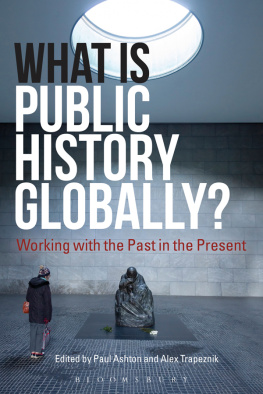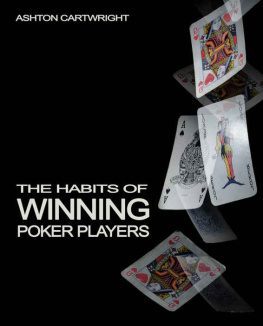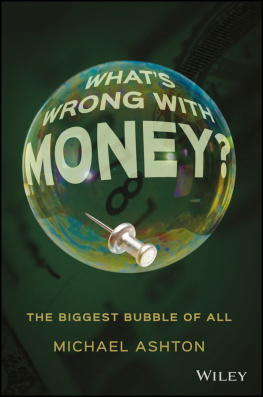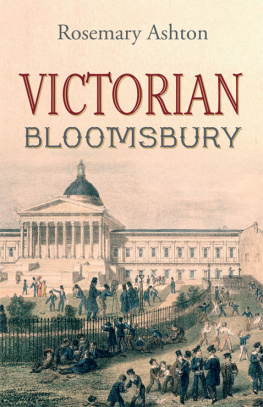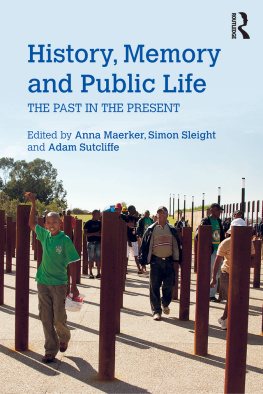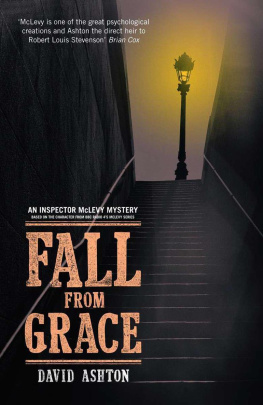Paul Ashton is adjunct professor at Macquarie University, the University of Canberra and the University of Technology Sydney where, in 1999, he co-established the Australian Centre for Public History. Co-editor and founder of the journal Pubic History Review, his publications include Public History and Heritage Today, which he co-edited with Hilda Kean, and Once Upon a Time: Australian Writers on Using the Past, co-edited with Anna Clark and Robert Crawford.
Amritha Ballal is an architect and urban planner, and a founding partner at Space Matters, a multidisciplinary, Delhi-based design studio. Amritha teaches at the School of Planning and Architecture, Delhi, and is the co-editor of Bhopal 2011 Landscapes of Memory, which explores themes of spatial memory through the case of the Union Carbide tragedy site in Bhopal. Amritha has been nominated for the Rolex Arts Foundation Mentor Protg Initiative in 2014 and named in the annual international shortlist of emerging woman architects Architecture Journal, UK, in 2013. She has collaborated on urban research projects with the School of Planning and Architecture, Bhopal; Research Council of Norway; University of Tokyo; and University of Gothenburg. Amrithas works also include The City Is Our Home on urban homelessness. Her ongoing research includes documentation and study of traditional wood-carving techniques of Likhai in the Kumaon region of India.
Jeannette A. Bastian is a professor at the School of Library and Information Science, Simmons College, where she directs their Archives Management concentration. Formerly Territorial Librarian of the United States Virgin Islands from1987 to 1998, she holds an MPhil from the University of the West Indies (Mona, Jamaica) and a PhD from the University of Pittsburgh. She has widely published in the archival literature, and her books include West Indian Literature: A Critical Index, 19301975 (1982), Owning Memory: How a Caribbean Community Lost Its Archives and Found Its History (2003), Archival Internships (2008), Community Archives: The Shaping of Memory (co-edited with Ben Alexander, 2009), and Archives in Libraries: What Librarians and Archivists Need to Know to Work Together (with Megan Sniffin-Marinoff and Donna Webber, 2015). She is currently compiling and co-editing a Caribbean Archives Reader to support a new Masters in Archival Studies at the University of the West Indies.
Anne Brdder has a masters degree in history and cultural encounters from Roskilde University Denmark (2009) and a PhD in history from Aarhus University Denmark (2017). Before writing her PhD dissertation she has worked at different museums and in local archives. She continued working with her interest in museums in her PhD dissertation on World War II re-enactment and living history in open-air museums in Denmark. Her main research areas include uses of the past, memory, public history and gender studies. She has published articles on the role of the body in World War II re-enactment, authenticity in re-enactment and memories of the 1970s womens liberation movement in Denmark. She is currently coordinator of the research program Uses of the Past at Aarhus University and part-time lecturer at Roskilde University, mostly teaching within the area of uses of the past and gender studies.
Kresno Brahmantyo was a senior lecturer at the Department of History and Australian Studies Centre, University of Indonesia (UI) from 1992 to 2017. During this time he has spent three years at the Australian Centre for Public History at the University of Technology Sydney and has co-chaired the first public history conference in Indonesia in 2012 at UI. His work has appeared in publications including the Oxford Handbook of Public History (2017) and the journal Public History Review. Kresno is currently establishing an independent centre for public history in Indonesia.
Denis Byrne is a senior research fellow at the Institute for Culture and Society, Western Sydney University. He is an archaeologist and specialist in heritage studies whose work has been in the fields of Indigenous and migrant heritage in Australia as well as in the history and cultural politics of heritage conservation in Southeast Asia and China. His books, Surface Collection (2007) and Counterheritage (2014), challenge Western-derived heritage practices in Asia and explore new ways of writing archaeology. He is currently exploring the history and archaeology of coastal reclamation in Australia and Asia, seeing them as key artefacts of the Anthropocene.
Christopher J. Castaeda is professor of history at California State University, Sacramento. He is the author of Times of Propaganda and Struggle: El Despertar and Brooklyns Spanish Anarchists, 18901905, in Radical Gotham: Anarchism in New York City from Schwabs Saloon to Occupy Wall Street (edited by Tom Goyens, 2017) and a forthcoming chapter titled Yours for the Revolution: Cigar Makers, Anarchists and Brooklyns Spanish Colony, 18781925, in Hidden Out in the Open: Spanish Migration to the United States (18751930) (co-edited by Phylis Martinelli and Ana Varela-Lago). He is currently working on a co-edited volume with Montse Feu Lpez that is tentatively titled Transnational Libertad: Hispanic Anarchism in the United States. Previously, he has authored numerous books and articles related to business history as well as contributed to and co-edited River City and Valley Life: An Environmental History of the Sacramento Region (2013).
Thomas Cauvin is Assistant Professor of History at Colorado State University. His teaching, research and projects are based on three principles: international comparison, public participation and the application of history to present-day issues. In 2018, he became the president of the International Federation for Public History that works at changing the way historians research, communicate and share history in/with the public. His publications include Public History: A Textbook of Practice (Routledge), the first single-authored public history textbook in North America.
Indira Chowdhury is the founder director of the Center for Public History at the Srishti Institute of Art, Design and Technology, Bengaluru. Awarded the Commonwealth Scholarship in 1989, she has completed her PhD in history from the School of Oriental and African Studies, London (1993). Indira taught at Jadavpur University until 2002. Her book, The Frail Hero and Virile History (1998), was awarded the Tagore Prize in 2001. From 2007 she began to dedicate herself to creating archives and founded Archival Resources for Contemporary History in Bengaluru. She was awarded the New India Foundation Fellowship in 2006 for her book Growing the Tree of Science: Homi Bhabha and the Tata Institute of Fundamental Research (2016). Indira is a founding member of the Oral History Association of India and has been its president. She has also been president of the International Oral History Association.
Mark Donnelly is a principal lecturer in history at St Marys University, Twickenham, London. He has set up the universitys MA in Public History in 2015 and continues to teach on the course. He is a co-director of the Research Centre for Philosophy of History at St Marys. He is also one of the co-conveners of the Institute of Historical Researchs Public History seminar. His recent books are


